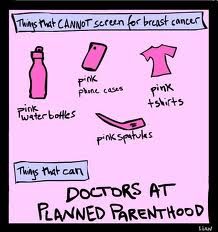(10 am. – promoted by ek hornbeck)
 Since of the Susan G. Komen for the Cure charity’s decision to eliminate funding to Planned Parenthood for breast cancer screenings, the Komen foundation has come under not just criticism for abandoning many women’s only option for breast cancer screening but it has brought to light some very ugly truths about the organization. The most critical one is that its pink ribbon campaign has done more harm than good. As David Dayen and TBogg at FDL both note, Komen’s official line that “our priority is and always will be the women we serve” is a joke considering the number of women who use Planned Parenthood for their health care and that Komen does virtually nothing for women’s health or fighting breast cancer
Since of the Susan G. Komen for the Cure charity’s decision to eliminate funding to Planned Parenthood for breast cancer screenings, the Komen foundation has come under not just criticism for abandoning many women’s only option for breast cancer screening but it has brought to light some very ugly truths about the organization. The most critical one is that its pink ribbon campaign has done more harm than good. As David Dayen and TBogg at FDL both note, Komen’s official line that “our priority is and always will be the women we serve” is a joke considering the number of women who use Planned Parenthood for their health care and that Komen does virtually nothing for women’s health or fighting breast cancer
A documentary that premiered last fall at the Toronto Film Festival, Pink Ribbons, Inc, that is about to be released in Canadian theaters, exposes the Pink Ribbon campaign for what it is, a money raising farce for corporations that have done nothing to find a cure for breast cancer but in some cases may have contributed to its rise:
Indignant and subversive, “Pink Ribbons, Inc.” resoundingly pops the shiny pink balloon of the breast cancer movement/industry, debunking the “comfortable lies” and corporate double-talk that permeate the massive and thus-far-ineffectual campaign against a disease that claims nearly 60,000 lives each year in North America alone. Veteran helmer Lea Pool, working from Samantha King’s book, won’t be making any friends with her full-frontal attack on the corporate co-option of the breast cancer cause, which could limit Stateside circulation of this Canadian production. But there are plenty of women who’ll want to see it. And they’ll be seeing red, not pink.
The thrust of King’s thesis is that all the pink-themed walk-a-thons, parades, singing children and rose-lit monuments (the Empire State Building, Niagara Falls), actually do more harm than good. By putting a warm and fuzzy spin on the state of breast cancer, the public is distracted from some very ugly numbers: In 1940, a woman had a one-in-22 chance of developing breast cancer; today, the number is one in eight. Only 20%-30% of women with breast cancer have high-risk factors, which means no one really knows what causes the disease. The leading foundations involved in funding cancer research are peopled by representatives of the pharmaceutical, chemical and energy industries, so their ethics are inherently compromised.
This article from Salon’s Mary Elizabeth Williams details where all the Komen money goes. They raise a huge amount of money but only 24% goes to research and yet spends:
“a million dollars a year in donor funds” aggressively going after other organizations that dare to use the phrase “for the cure” – including small charities like Kites for a Cure, Par for the Cure, Surfing for a Cure, Cupcakes for a Cure, and even a dog-sledding event called Mush for the Cure.
The Komen foundation is nothing more than a front for corporations. Running for cures, buying pink ribbons and balloons will not find a cure and hasn’t done a damn thing but rake in profits for corporations. Those pink ribbons should make every woman and man (they get breast cancer, too) see red.

8 comments
Skip to comment form
Author
Thank you for posting this.
In addition, I’d like to thank SGC Foundation for deciding to not contribute to Planned Parenthood anymore.
You know, people are outraged about that decision, as well we should be, but I just realized that it was a very good thing they did. That’s because they’ve now exposed themselves more so than ever, and people at large are now getting a good look at this organization and how they are NOT what they have always “appeared” to be to most people.
Susan G. Komen Foundation Also Stops Funding Embryonic Stem Cell Research